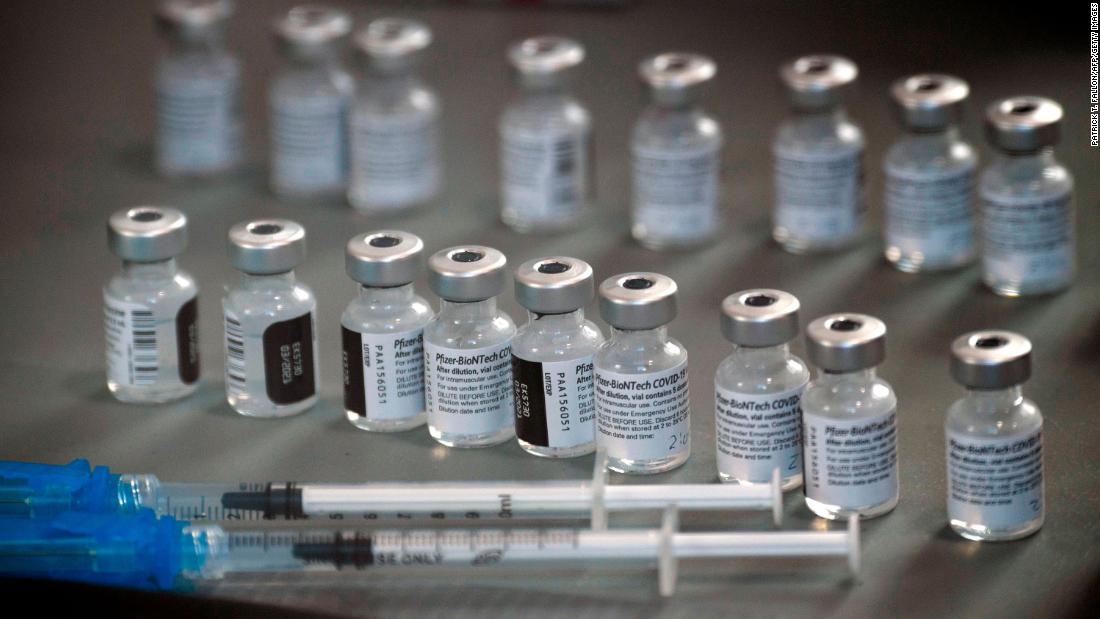The PHE Siren Study, carried out on healthcare professionals under the age of 65, found that one dose of the vaccine reduced the risk of infection by 72% after three weeks, while two doses of the vaccine reduced the risk of infection by 85%. This high level of protection extended to the coronavirus B.1.1.7 variant first identified in the UK in December.
Health workers were tested for Covid-19 infection every two weeks using CRP tests and twice a week with lateral flow tests, explained Dr. Susan Hopkins, director of strategic response at PHE, which means that ” there have been many asymptomatic tests, “she said.
“Overall, we are seeing a really strong effect in reducing any infection: asymptomatic and symptomatic,” said Hopkins during a news conference held by the UK’s Science Media Center on Monday.
The PHE also analyzed routine test data based on symptomatic disease in more than 12,000 people, which showed that a dose of the Pfizer / BioNTech vaccine was 57% effective against symptomatic COVID-19 disease in people over 80, four weeks after the first dose. This increased to 88% one week after the second dose.
Previous data has also shown that vaccinated people who are subsequently infected are much less likely to die or be hospitalized with the virus. People over 80 who were infected after vaccination were 41% less likely to be hospitalized with the virus and 57% less likely to die from it.
PHE predicted that protection against serious illness would likely be greater than 75% in those who received a dose of the Pfizer-BioNTech vaccine.
“The good sign is that, in general, we are beginning to see a reduction in hospitalizations and deaths in the vaccinated age groups [and] at least part can be attributed to the vaccination program, “said Dr. Mary Ramsay, head of immunization at PHE, during the press conference.
She said that while the current blockade in the UK has contributed to the decline in hospitalizations, “the faster rate of decline can be attributed in some ways to the vaccination program.”
In the PHE statement, Ramsay warned that, despite the encouraging signs “we still don’t know how much these vaccines will reduce your risk of passing Covid-19 to other people”, adding that vaccinated people should continue to follow the requests for permanence. home.
The UK has focused on vaccinating as many high-risk people as possible with the first dose.
Ramsay said the findings “reinforce the policy of giving that single dose to more people to prevent more deaths and more hospitalizations from time to time and to come back later and get the second dose that will give them more lasting protection.”
UK Health Secretary Matt Hancock said it was “extremely encouraging” that the data supported “the UK government’s decision to” maximize the number of people vaccinated with a single dose “.
“Protection against serious illnesses is at least 75% or more and this is what you see in Scotland,” said Ramsay at the press conference referring to the first data from a Scottish study on the effect of injections by Pfizer and Oxford- AstraZeneca in the community.
Substantial drop in hospital admissions
In that study, also released on Monday, the launch of the Covid-19 vaccination was associated with a substantial drop in the risk of hospitalization because of the disease in Scotland.
The researchers compared hospital admissions between those who received the first dose and those who did not.
In the fourth week after receiving the initial dose, the Pfizer vaccine reduced the risk of hospitalization of Covid-19 by up to 85%.
The Oxford-AstraZeneca vaccine reduced the risk of hospitalization by up to 94%.
The preliminary study, which has not yet been peer-reviewed, is the first to examine the effect of the two vaccines in preventing serious illnesses that result in hospitalization across the country, with previous efficacy results from clinical trials.
The EAVE II project, carried out by researchers from the Universities of Edinburgh, Strathclyde, Aberdeen, Glasgow and St Andrew’s and Public Health Scotland (PHS), analyzed a data set covering almost the entire Scottish population of 5.4 million people.
The researchers analyzed data for every week between December 8 and February 15. During this period, 1.14 million vaccines were administered (about 650,000 people were vaccinated with Pfizer and about 490,000 with Oxford-AstraZeneca), with 21 percent of the Scottish population receiving the first dose, according to a statement press conference at the University of Edinburgh.
Among those aged 80 and over – one of the highest-risk groups – vaccination was associated with an 81 percent reduction in the risk of hospitalization for Covid-19 in the fourth week, when the results of both vaccines were combined, according to with the press release.
“These results are very encouraging and have given us great reason to be optimistic for the future. We now have national evidence – across an entire country – that vaccination offers protection against hospitalizations by Covid-19,” principal investigator Aziz Sheikh, Director of the Usher Institute at the University of Edinburgh said in the statement.
“The launch of the first dose of the vaccine now needs to be accelerated globally to help overcome this terrible disease.”
Arne Akbar, president of the British Society for Immunology, added: “Now we need to understand the duration of this protection for one dose of the vaccine.”
“While more research is needed, in general these new findings should provide assurance about the UK’s decision to offer both doses of the vaccine 12 weeks apart.”
